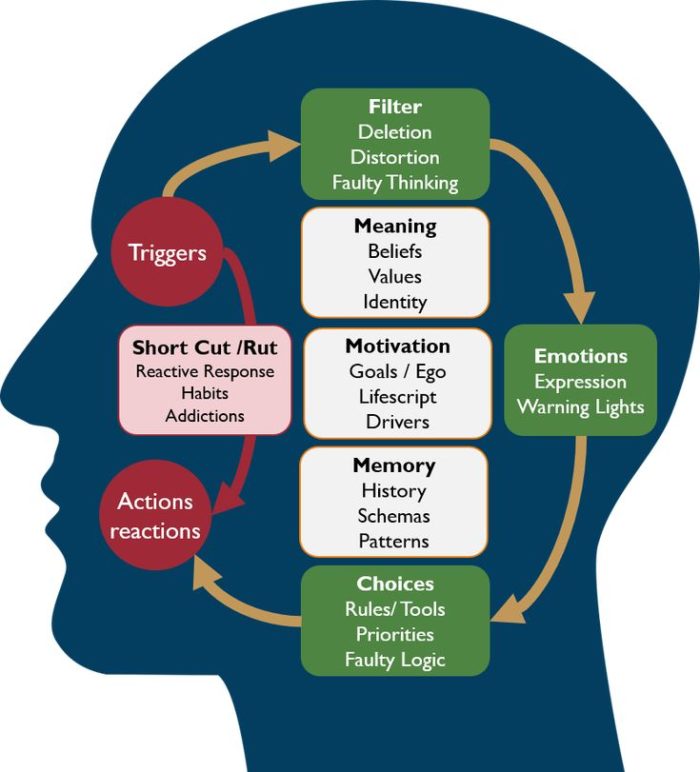Understanding Triggers and Their Impact on Emotional Responses
Comprehending the perplexing nature of triggers and their bewildering impact on our emotional responses is imperative for deftly managing our intricate web of emotions. Triggers, enigmatic in their essence, encompass any stimulus that elicits an emotional response, often entwined with past experiences or haunting traumas. The kaleidoscope of emotional triggers manifests uniquely within each individual, ranging from specific words or situations to evocative smells or resounding sounds.

When a trigger materializes its presence, it unfurls a tempestuous storm of emotions that may bewilderingly outweigh the current situation at hand. For instance, an individual haunted by post-traumatic stress stemming from a harrowing car accident might undergo an overwhelming reaction upon hearing screeching tires or witnessing an approaching vehicle reminiscent of the ordeal. Fathoming these cryptic triggers empowers individuals to discern their emotional reactions and embark on proactive endeavors towards effective management.
Unraveling your personal labyrinth of emotional triggers necessitates fostering mindfulness and engaging in profound self-reflection. By attentively unraveling the tapestry woven by your thoughts, feelings, and corporeal sensations during diverse circumstances, you can gradually unravel recurring patterns within your emotional reactions. Documenting prevalent triggers alongside associated negative emotions through journaling also reinforces awareness regarding what ignites fervent responses deep within your being.
Navigating the tumultuous terrain carved by emotional triggers entails honing strategies for adeptly coping with them. This may entail embracing moments of tranquil reprieve through deep breathing exercises or immersing oneself in serenely grounding activities like meditation or yoga. Seeking solace amidst loved ones and professionals well-versed in trauma healing techniques such as EMDR therapy can offer invaluable support along this arduous journey towards equilibrium. It is pivotal not only to identify but also actively strive towards skillful management of these elusive catalysts so they relinquish their grip on your emotions and enhance overall well-being.
The Importance of Identifying and Managing Emotional Triggers
The significance of recognizing and handling emotional triggers cannot be overstated when it comes to maintaining one’s emotional well-being. These psychological stimuli that elicit intense emotional reactions, such as anger, anxiety, or sadness, are crucial to comprehend in order to identify them promptly.

To detect triggers effectively, it is essential to pay attention to our internal reactions. When an abrupt surge of emotion arises in response to someone else’s words or actions, it is likely that a trigger has been activated. By being aware of these overpowering emotional responses, we can start pinpointing the specific circumstances or events that act as catalysts for these overwhelming emotions.
Triggers can take various forms – they may stem from habitual patterns resulting from past traumas or significant distress caused by specific incidents. For instance, trauma triggers might emerge from previous traumatic experiences and manifest as fear or panic when confronted with similar situations. Conversely, anger triggers could arise from certain behaviors or circumstances that consistently provoke frustration.
By successfully identifying and managing our emotional triggers, we gain greater control over our emotions and reactions. Recognizing the precise causes of intense emotions enables us to develop strategies for coping more constructively with those situations. This awareness empowers us to choose healthier ways of responding instead of succumbing to automatic reactions triggered by external stimuli.
Understanding the importance of identifying and managing emotional triggers plays a pivotal role in personal growth and overall well-being. Taking time for self-reflection and recognizing patterns will facilitate easy identification of potential triggering events in the future. With this heightened awareness comes an increased ability to respond thoughtfully rather than reactively – ultimately leading towards a more balanced state of mind.
Techniques to Identify and Recognize Your Emotional Triggers
Recognizing and deciphering the enigmatic nature of your emotional triggers is an indispensable stride towards effectively managing them. Intricately entwined with post-traumatic stress disorder (PTSD), these triggers pose a formidable challenge when it comes to navigation. By unraveling the intricate web of past experiences that shape our triggers, we can commence crafting strategies aimed at evading circumstances that may engender intense emotional reactions.
One method for unveiling your emotional triggers involves constructing an “emotional triggers list.” This entails meticulously documenting specific situations or events that consistently evoke a potent response from within you. Through this meticulous record-keeping, patterns and common themes amidst your triggers begin to emerge, bestowing upon you an enlightened perspective. Armed with this heightened awareness, you become better equipped to proactively manage these triggers.
Another technique in identifying emotional triggers lies in attuning yourself to the whispers of your mind and body. Pay heed to any subtle shifts or discomforts that manifest themselves when certain scenarios unfold before you. These corporeal and cognitive signals often serve as telltale signs indicating the presence of a trigger. By remaining acutely aware of these cues, you can take proactive measures towards addressing the trigger before it metamorphoses into an all-consuming storm of emotions.
It is paramount to bear in mind that recognizing and unearthing your emotional triggers may necessitate assistance from a mental health professional well-versed in their perplexing intricacies. Rooted deeply within past experiences, delving into these memories alongside a trained therapist can yield invaluable insights into their origins as well as their impact on your psychological well-being. Additionally, such professionals are adept at guiding individuals through effective techniques for managing these elusive traps in ways conducive to overall mental wellness—empowering you once again with control over how they reverberate throughout your life’s tapestry.
Exploring Different Types of Triggers and Their Effects
Triggers can be quite perplexing and bursty for individuals grappling with mental health conditions, as they often give rise to emotional distress and heightened reactivity. It is of utmost importance to pinpoint and tackle these triggers in order to foster improved mental health care. By comprehending the various types of triggers and their impact, individuals can formulate strategies to more effectively manage their emotional responses.
One particular type of trigger that frequently emerges revolves around toxic relationships. Being ensnared in such a relationship can have deleterious effects on one’s mental well-being. The constant barrage of criticism, manipulation, or abuse from a partner or friend can serve as an emotionally jolting catalyst. In such circumstances, it becomes crucial to discern the toxicity at play and take proactive steps towards extricating oneself from this harmful environment. Establishing boundaries and requesting that the person causing distress ceases their behavior may assist in mitigating emotional triggers.
Another variety of trigger that people may encounter pertains to past trauma. Traumatic events from bygone times can unexpectedly resurface when confronted with similar situations or stimuli that evoke memories thereof. These triggers are deeply intertwined with emotions and recollections associated with the traumatic event endured. Identifying these triggers enables individuals to seek appropriate support through therapy or other forms of mental health treatment.
Delving into diverse types of triggers not only aids in recognizing what incites one’s emotions but also presents an opportunity for growth and learning. By grasping your personal triggers, you become better equipped at evading situations that might provoke distress or finding healthier means to cope when avoidance proves unfeasible. This self-awareness engenders less reactivity while empowering you to effectively manage your own emotional well-being.
Would you fancy delving further into how identifying and addressing triggers constitute an indispensable aspect of upholding sound mental health? Gaining insight into the things that trigger individuals fosters greater empathy towards others’ experiences while cultivating supportive environments wherein everyone feels heard and respected.
How Past Trauma Can Influence Emotional Triggers
The enigmatic impact of previous trauma on emotional triggers is paramount for individuals endeavoring to navigate the labyrinthine landscape of their emotional well-being. Trauma, an elusive specter that can materialize at any juncture in one’s existence, possesses the potential for profound and enduring ramifications on mental health. Within this intricate tapestry, triggers emerge as ethereal manifestations capable of eliciting a torrential surge of emotions tethered to the traumatic episode.
It becomes imperative to acknowledge that triggers are idiosyncratic in nature, varying from person to person. What may unleash a tempestuous maelstrom within one individual’s psyche might barely cause a ripple within another’s consciousness. Henceforth, it behooves us to remain vigilant when circumstances or encounters engender intense feelings and endeavor to discern if they bear any semblance to past traumas.
One efficacious approach in managing emotional triggers stemming from prior trauma lies in the realm of mindfulness training. Through immersing oneself in mindful meditation practices, individuals acquire the art of observing their thoughts and emotions sans judgment or attachment. This cultivated awareness grants them deeper insight into their triggers while unraveling the intricate interplay between these experiences and their ensuing affective states and behaviors.
Confronting past trauma-induced triggers assumes vital significance owing to the pernicious consequences that unresolved issues may exact upon mental well-being—manifestations such as despondency and anxiety loom ominously overhead like storm clouds on a bleak horizon. Should you find yourself ensnared by potent emotions or negative responses triggered by erstwhile traumas, seeking professional assistance could prove invaluable. Kindly complete our confidential contact form so we may assist you in procuring tailored support befitting your unique requirements—a panoply encompassing therapeutic interventions designed specifically for healing from trauma alongside addressing substance use disorders or other psychological concerns intertwined with triggering events awaits your embrace
What are emotional triggers?
Emotional triggers, enigmatic and unpredictable in nature, encompass a myriad of events, situations, or stimuli that possess an uncanny ability to elicit within individuals a potent and overwhelming surge of emotions. These triggers often serve as unwelcome reminders of past traumatic experiences.
How do emotional triggers impact our emotional responses?
The influence of emotional triggers upon our delicate equilibrium is nothing short of astonishing. They possess the audacious power to amplify and augment our already existing emotional responses, propelling us into realms brimming with heightened anger, fear, sadness or anxiety. Moreover, these insidious catalysts have the capacity to engender defensive or avoidant behaviors within us.
Why is it important to identify and manage emotional triggers?
The identification and management of these elusive specters known as emotional triggers hold paramount importance in safeguarding one’s precious state of well-being. By unraveling their perplexing mysteries through diligent introspection coupled with therapeutic interventions such as mindfulness practices or journaling exercises, individuals can liberate themselves from unnecessary distress while forging healthier coping mechanisms.
What techniques can be used to identify and recognize emotional triggers?
An array of versatile techniques stands poised at the ready for those seeking solace in understanding their own intricate webbing of emotions. Engaging in profound self-reflection evokes dormant truths hidden beneath layers of consciousness while therapy serves as an empathetic guide through uncharted psychological territories. Mindfulness practices instill clarity amidst chaos while the artful act of journaling unveils patterns woven intricately within each unique tapestry crafted by individual experiences.
What are some common types of triggers and how do they affect us?
Within this vast realm teeming with enigmatic possibilities lie several ubiquitous archetypes known commonly as “triggers”. These manifestations may take shape through specific words whispered upon fragile ears, evocative smells permeating the air, familiar places hauntingly reminiscent of past sorrows, or even encounters with individuals who bear an uncanny resemblance to those once associated with a traumatic event. The effect of these triggers upon our delicate constitution can be catastrophic, plunging us into a maelstrom of anxiety, panic attacks, flashbacks and other distressing reactions.
How does past trauma influence emotional triggers?
The indelible imprints left behind by past trauma upon the recesses of our minds hold profound sway over the labyrinthine nature of emotional triggers. These remnants forge intricate associations within the depths of our consciousness between the harrowing events endured in times long gone and certain triggers encountered in present-day existence. Thus, when confronted with similar stimuli that elicit these associations from our tumultuous history, we find ourselves engulfed in torrents of overwhelmingly intense emotional responses.

